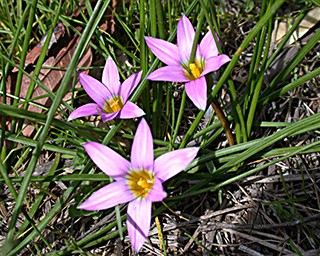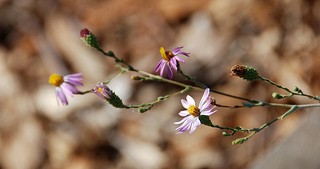 Romulea rosea. Photo © Dr. Dean Taylor.
Romulea rosea. Photo © Dr. Dean Taylor.
Onion grass (Romulea rosea) is a perennial herb that appears grass-like but grows like an annual and is native to the hot Mediterranean climate of South Africa. It produces purple flowers from March to April. Onion grass is an incredibly invasive noxious weed in Australia, where it was first introduced as a garden ornamental and in contaminated seed, and it has taken over pastures and natural areas. It is particularly a problem for agriculture, as it outcompetes desired pasture plants and is toxic to livestock, especially sheep.
Unfortunately, onion grass is beginning to appear in the U.S., including California, where it was likely introduced via contaminated seed and by cultivation as an ornamental. If allowed to become invasive in California, spread of this species could have disastrous consequences for agricultural and wild pasture lands.
To prevent this from happening, it is incredibly important to avoid cultivating onion grass as an ornamental, and to ensure that agricultural and other equipment is clean when being transported between areas because seeds and bulbs will spread and establish easily in open areas of dirt and mud. Though the flowers are attractive, onion grass can easily escape garden cultivation, so we encourage you to choose an alternative species without the negative impacts. An alternative plant suggestion can be found below.
Native Alternative
 Corehtrogyne filaginifolia. Photo © Pete Veilleux.
Corehtrogyne filaginifolia. Photo © Pete Veilleux.
California aster (Corethrogyne filaginifolia), also known as California corethrogyne, is a perennial flowering daisy with violet petals and yellow centers. It grows well in a variety of habitats, and is a great butterfly attractant. California aster is a great alternative to onion grass because its flowers are a similar color, it is also low growing (reaching a maximum height of about three feet), and it is native to California.